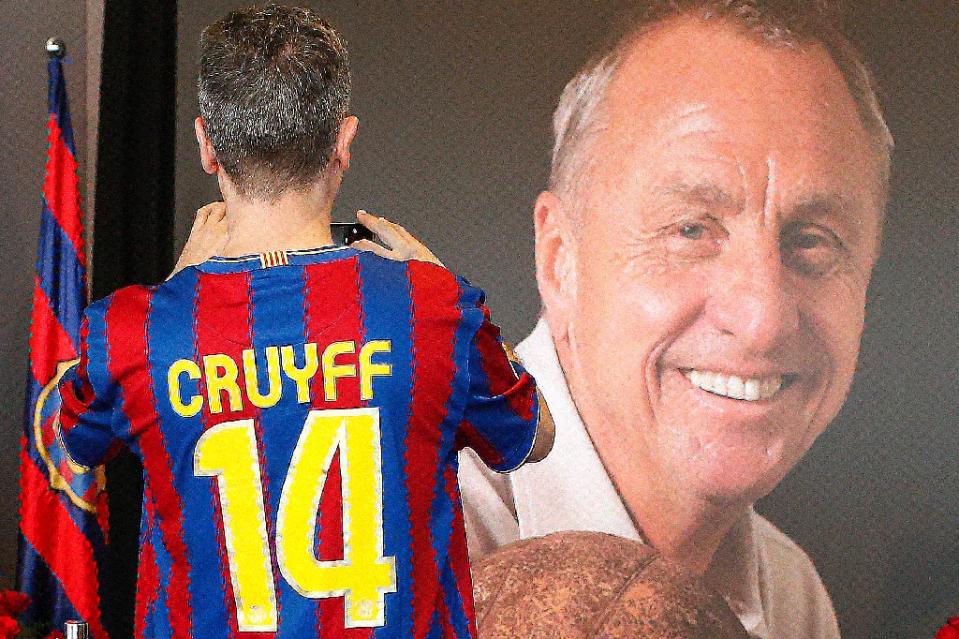El Clasico gives Barcelona the perfect setting to honor the late Johan Cruyff

There is perhaps no more fitting game for Barcelona to honor recently deceased club icon Johan Cruyff than the Clasico.
Because, for Barca, the home match against Real Madrid is the biggest day of the La Liga season. And because Cruyff, in ways big and small, made the Catalan club the most copied and admired and loved outfit of the last few decades.
[ El Clasico Live: Barcelona vs. Real Madrid | Match stats | Barca's November blowout ]
The players will wear special jerseys, with their gratitude to the Dutch forward and his monumental legacy embroidered on their chests.
Cruyff tribute on Barcelona's El Clasico shirt https://t.co/8SjIViVqt4 pic.twitter.com/hxyYztTrtB
— MARCA in English (@MARCAinENGLISH) April 1, 2016
Gràcies Johan.
Catalan for "Thank you, Johan."
[ FC Yahoo: This El Clasico presents odd matchup between Barcelona, Real Madrid ]
None of the players on the field will have overlapped with Cruyff as either a player or a manager. He played on the field from 1973 through 1978, after all. And when he returned as manager a decade later, he lasted until 1996. Most won't even have felt his large, behind-the-scenes influence in any kind of acute way.
Yet they are all products of him and his designs.
When Cruyff first arrived at the club, in the wake of his mentor, manager and father-in-football Rinus Michels, Barcelona had only just begun dabbling in developing its own youth players. When he returned as manager in 1988, he made it a priority and saw to it that the club's burgeoning philosophy be spread and indoctrinated in the very youngest of players. The first player he would promote to the senior team from the academy, which came to be known as La Masia, was a young central midfielder named Pep Guardiola.
And the rest, to lean on a heavy cliché, is history.
Cruyff's way of doing things, however heavy-handed he could sometimes be in getting his way, was practically codified into the club statutes and continues to permeate the club. The possession-obsessed playing philosophy, the fetishization of movement, the devotion to youth. But his honoring at El Clasic – there will also be fan displays – is poignant in a different way.
If it weren't for Cruyff, the Clasico might not be such a classic today.
When he finally made his debut at the club in October of 1973, after extended bureaucratic wrangling over his eligibility, Barca sat fourth from the bottom in La Liga. By the end of the season, the Catalans were champions for the first time in 14 years. In the decade before he returned as manager, Barca won the title just once and placed outside the top three five times. The final season before his appointment produced a sixth place, the worst finish in 23 years. Within three years of his comeback, the club would go on a four-season title run – still the longest in club history.
In the 74 years before Cruyff, Barca had been Spanish champions eight times. In the 42 years since: 15 times. And the Cules had never been European champions until Cruyff returned as manager. They have won five times since, tied with AC Milan for the most continental titles over that span.
Real Madrid, meanwhile, had been Spanish champions eight times in the 11 years before Cruyff arrived and five more times in the decade he was gone. Each time he arrived or returned at the club, Cruyff restored the balance with Real.
Then there's this: Had it been up to Cruyff's boyhood club Ajax, he would have joined Real Madrid when it sold him. The deal was done. And in those days, players went where they were told to go. But that was never how Cruyff operated. He thought it unethical for his club to decide who his next employer would be.
So Cruyff, a man of plentiful playing intellect, but also of historic ego and stubbornness, would decide that for himself. He threatened to retire until Ajax relented and sold him to Barcelona instead – an unheard-of thing to do in his time.
And thus the modern Clasico was born.
Leander Schaerlaeckens is a soccer columnist for Yahoo Sports. Follow him on Twitter @LeanderAlphabet.



